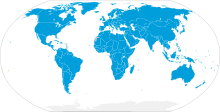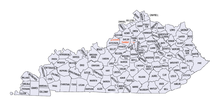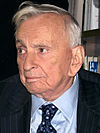The Politics portal
Politics (from Ancient Greek πολιτικά (politiká) 'affairs of the cities') is the set of activities that are associated with making decisions in groups, or other forms of power relations among individuals, such as the distribution of resources or status. The branch of social science that studies politics and government is referred to as political science.
It may be used positively in the context of a "political solution" which is compromising and non-violent, or descriptively as "the art or science of government", but also often carries a negative connotation. The concept has been defined in various ways, and different approaches have fundamentally differing views on whether it should be used extensively or in a limited way, empirically or normatively, and on whether conflict or co-operation is more essential to it.
A variety of methods are deployed in politics, which include promoting one's own political views among people, negotiation with other political subjects, making laws, and exercising internal and external force, including warfare against adversaries. Politics is exercised on a wide range of social levels, from clans and tribes of traditional societies, through modern local governments, companies and institutions up to sovereign states, to the international level.
In modern nation states, people often form political parties to represent their ideas. Members of a party often agree to take the same position on many issues and agree to support the same changes to law and the same leaders. An election is usually a competition between different parties.
A political system is a framework which defines acceptable political methods within a society. The history of political thought can be traced back to early antiquity, with seminal works such as Plato's Republic, Aristotle's Politics, Confucius's political manuscripts and Chanakya's Arthashastra. (Full article...)
Selected article
Political Animals and Animal Politics is a 2014 edited collection published by Palgrave Macmillan and edited by the green political theorists Marcel Wissenburg and David Schlosberg. The work addresses the emergence of academic animal ethics informed by political philosophy as opposed to moral philosophy. It was the first edited collection to be published on the topic, and the first book-length attempt to explore the breadth and boundaries of the literature. As well as a substantial introduction by the editors, it features ten sole-authored chapters split over three parts, respectively concerning institutional change for animals, the relationship between animal ethics and ecologism, and real-world laws made for the benefit of animals. The book's contributors were Wissenburg, Schlosberg, Manuel Arias-Maldonado, Chad Flanders, Christie Smith, Clemens Driessen, Simon Otjes, Kurtis Boyer, Per-Anders Svärd, and Mihnea Tanasescu. The focus of their individual chapters varies, but recurring features include discussions of human exceptionalism, exploration of ways that animal issues are or could be present in political discourse, and reflections on the relationship between theory and practice in politics.
Featured picture

Parliament House is the meeting facility of the Parliament of Australia located in Canberra, the capital of Australia. The building was designed by Mitchell/Giurgola Architects and opened on 9 May 1988 by Elizabeth II, Queen of Australia. At the time of the construction, it was the most expensive building in the world at more than A$1.1 billion.
Selected quote
Selected biography
Dobroslav Jevđević (1895–1962) was a Bosnian Serb politician and self-appointed Chetnik commander in the Herzegovina region of Yugoslavia during the Second World War. He was a member of the inter–war Chetnik Association and the Organisation of Yugoslav Nationalists party in the Kingdom of Yugoslavia, a Yugoslav National Party member of the National Assembly, and a leader of the opposition during King Alexander's dictatorship. Following the invasion of Yugoslavia by the Axis in April 1941, he became a Chetnik leader in Herzegovina and joined the Chetnik movement of Draža Mihailović, although he often operated independently from Mihailović. Jevđević collaborated with the Italians and later the Germans in actions against the Yugoslav Partisans. During a joint Italian-Chetnik Operation Alfa, Jevđević's Chetniks, along with other Chetnik forces, were responsible for killing between 500 and 1,700 Bosnian Muslim and Catholic civilians in the Prozor region in October 1942. His force also participated in one of the largest Axis anti-Partisan operations of the war, Case White, in the winter of 1943. In the spring of 1945, he fled to Italy where he resided until his death.
Did you know (auto-generated) -

- ... that advertisements for Road 96 were taken down by Facebook for being too political?
- ... that Ambati Rambabu, the state minister for irrigation of Andhra Pradesh, dabbled in acting before entering politics?
- ... that after being arrested for organizing a general strike in 1920, S. Girinis was sent to the Soviet Union following a Soviet-Lithuanian exchange of political prisoners?
- ... that Walker Keith Baylor, a strong believer in phrenology and physiognomy, determined the fitness of political candidates by measuring their faces and heads with a tape measure?
- ... that nearing the end of his tenure as mayor of Tegal, Indonesia, Adi Winarso took part in a talkshow with his former political competitors?
- ... that New Jersey politics expert Nick Acocella hosted Pasta & Politics, a television show where he would make pasta with various politicians including Thomas Kean, Cory Booker, and Chris Christie?
More did you know...
- ...that the phrase "lipstick on a pig" may have its origins in the 18th-century expression "A hog in armour is still but a hog"?
- ...that the Pirate Party of the United States was formed after a 2006 raid by the Swedish police on the servers of The Pirate Bay, a popular file sharing website?
- ...that Andrey Kirillovich Razumovsky, at the time Ambassador of the Russian Empire to the Austrian Empire, commissioned three string quartets from Beethoven?
- ...that politicians discuss the ways in which they and their families have suffered because of Oprahization?
- ...that Democratic and Republican plans for the 2012 United States federal budget both focus on deficit reduction, but differ in their changes to taxation, entitlement programs, and research funding?
- ...that Conservative Party candidate Bernard Trottier won a seat in the 41st Canadian Parliament by defeating the incumbent Leader of the Liberal Party of Canada in the 2011 federal election?
- ...that Caedwalla of Wessex conquered southeast England during his brief 7th century reign?
- ...that when the Tennessee Center for Policy Research, a "free-market think tank," criticized Al Gore's energy use, CNN mistakenly called the organization an environmental group?
In this month
- May 5, 2005 – A General Election in the United Kingdom sees Tony Blair's Labour government returned to office with a reduced majority of 66.
- May 14, 1948 – The Declaration of Independence of Israel is made.
- May 18, 1948 – The first Legislative Yuan of the Republic of China officially convenes in Nanking.
News and Current events
- August 11: 4 local government areas in New South Wales, Australia locked down after COVID-19 case
- August 11: Australia: AstraZeneca vaccine access expanded by Victorian government
- August 1: Australia: Victorian lockdown lifted
- July 29: Tunisia's president dismisses prime minister, suspends parliament
- July 25: Australia: Wikinews interviews Reg Kidd, mayor of the City of Orange, about COVID-19 lockdown and local government
- July 23: South Australia enters week-long lockdown to contain COVID-19 Delta variant spread
- July 21: Technological University Dublin senior lecturer Dr Lorcan Sirr speaks to Wikinews on housing market in Ireland
- July 21: Three rural councils in New South Wales, Australia enter 7-day lockdown
- July 21: Australia: Victoria lockdown extended by a week with 85 active cases recorded
- July 15: California governor signs new state budget, eligible Californians to get stimulus payments
Topics and categories
General images
Related portals
Associated Wikimedia
The following Wikimedia Foundation sister projects provide more on this subject:
- Commons
Free media repository - Wikibooks
Free textbooks and manuals - Wikidata
Free knowledge base - Wikinews
Free-content news - Wikiquote
Collection of quotations - Wikisource
Free-content library - Wikiversity
Free learning tools - Wiktionary
Dictionary and thesaurus
























































